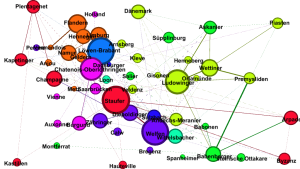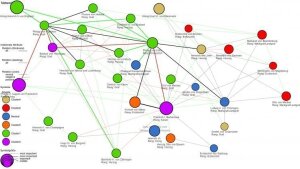The Archbishops of Cologne and the Empire
Ph.D. project by Clemens Beck, M.A.
Funding: Doctoral Scholarship of the Studienstiftung des deutschen Volkes.
Marriage network of the German high nobility in the 12th century (the size of the nodes depends on the eigenvector centrality)
Picture: MEPHISTO, CC BY 4.0The dissertation examines the relations between the Cologne archbishops Philipp of Heinsberg, Bruno of Berg as well as Adolf of Altena and the Hohenstaufen emperors after the fall of Henry the Lion until the open outbreak of the Hohenstaufen-Welfish throne dispute in 1198. While before 1180 there was close cooperation between Archbishop Philip of Cologne and the Hohenstaufen Emperor Frederick I Barbarossa, in the throne dispute the Cologne Archbishop Adolf of Altena was the leading force behind the election and coronation of the Guelph pretender to the throne, Otto IV, against Frederick Barbarossa's son Philip of Swabia. Political group ties changed greatly during this period, for which historical research has never found a convincing answer. Because of the complexity of events in the Lower Rhine during the 18 years under study, they were reduced to an "anti-Staufian tradition" of the archbishops of Cologne.
Using the Historical Network Analysis, it will be proved that this is a "master narrative" of the older research. For the analysis and evaluation of the networks, personal interactions of the clerical and secular nobility were transferred into a sociomatrix based on interactions in historiographic sources, mentions in charters, and closed or intended marriage connections and evaluated by network analysis.
Political network of the year 1187, during a conflict between the cluster of the archbishop of Cologne (green) and the supporters of Emperor Frederick Barbarossa (purple) over the occupation of the archbishopric of Trier.
Image: MEPHISTO, CC BY 4.0Initial findings show that the Cologne archbishops were by no means in permanent enmity with the Hohenstaufen emperors after 1180. Instead, through the formation of various clusters in the network of the most influential actors of the Holy Roman Empire, connections of the high medieval nobility with the ecclesiastical princes, various external factors affected the Cologne archbishops, leading to a temporary front against the Hohenstaufen. At the same time, the respective antagonism was repeatedly resolved by close cooperation between the actors.

